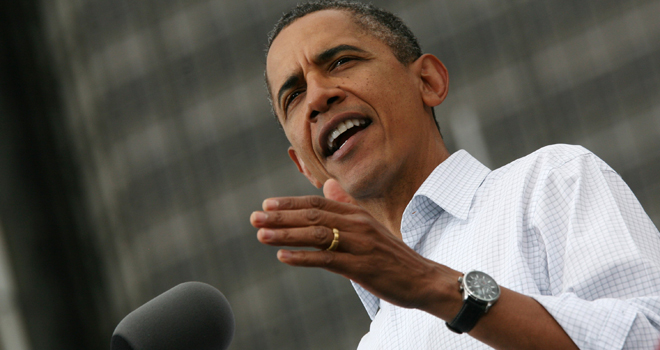The Great Recession has been more than an economic downturn. The term “downturn” suggests the situation is fairly short and fixable, a temporary flattening in America’s unending economic slope. It has been three years since the stock market tanked and contraction started, and the Obama administration just announced that it expects unemployment to remain above 9 percent through 2012. So, forget short. But what about fixable?
President Obama’s jobs speech may be highly anticipated by the media and in Washington, but it seems certain that the GOP majority in the House will reject whatever Obama proposes. And as we’ve seen with the deficit reduction proposals that the super committee could undertake as part of their deficit reduction task, the priorities of Congress and what the American people would accept is oftentimes at odds.
That’s why there seems to be a tinge of hopelessness in the results of a new Pew/Washington Post survey released Wednesday on potential job creation ideas the President could outline tonight: no single policy is seen as something that would make a real dent in the problem, signaling more than just discontent with the process, but a fundamental belief that there’s little our institutions can or are indeed willing to do.
The Pew/WaPo poll looked at four options: more infrastructure investments, cutting business taxes, reducing the deficit through cuts, and cutting personal income taxes. President Obama is expected to embrace proposals for infrastructure projects and personal income tax reduction, through new spending on highways, roads and bridges and an extension of the payroll tax cut already in place. The infrastructure option is the most “popular,” with 36 percent saying it will do “a lot” to help the economy and 41 that say it will help “a little.” Surprisingly, the personal income tax break is the least popular option, with only 24 percent saying it will make a big difference and 36 saying only a little. The balance in both cases said that proposal would make no difference at all.
In each case, there is a clear majority of Americans that think the proposals will either make no progress or only a little, which is perhaps a prudent view given the severity of the recession. But it also shows little hope that anything–anything–the government can do will help the American economy off the floor.
The political consequences have of course been intertwined with the economic pessimism. A recent CNN poll showed that 8 in 10 Americans think the country is still mired in a recession, regardless of the data. Gallup Editor-in-Chief Frank Newport drilled into the relationship between the poor economy and political leaders in Washington, pointing to the fact that the approval rating of President Obama and Congress, although at different levels, has correlated 90 percent since Feburary 2009. And those drops correlate nearly perfectly with negative views of the economy. Newport summarized the problem this way:
The point here is that, whatever we want to call it, there is a negative mood abroad in the general American consciousness at this juncture in history, and this negative mood is affecting Americans’ views in a very general way. Most political observers view the president’s job approval ratings and Congress’ job approval ratings as separate entities, which they are. But they are both subject to the same types of overall political and economic forces…..These data would suggest that it’s going to be hard for Obama to move his approval numbers much with one single speech, unless it is such a powerful speech that it viscerally changes Americans’ moods overnight. This is because Americans appear to be not so much evaluating Obama per se when we ask our approval/disapproval question, but rather responding to him in terms of their more general mood. And that mood is related to the economy, perhaps related to their views of the ineffectiveness and inefficiency of the way Washington works in general, and perhaps related to other, unknown factors. One speech probably doesn’t have much of a chance of changing that mood.
What the Pew data shows is that it’s not just that a single speech is unlikely to move Americans to a more confident place, but little IN that speech is likely to get them believing in the possibility of recovery either.









